(完整)初中祈使句,感叹句
- 格式:doc
- 大小:26.18 KB
- 文档页数:7
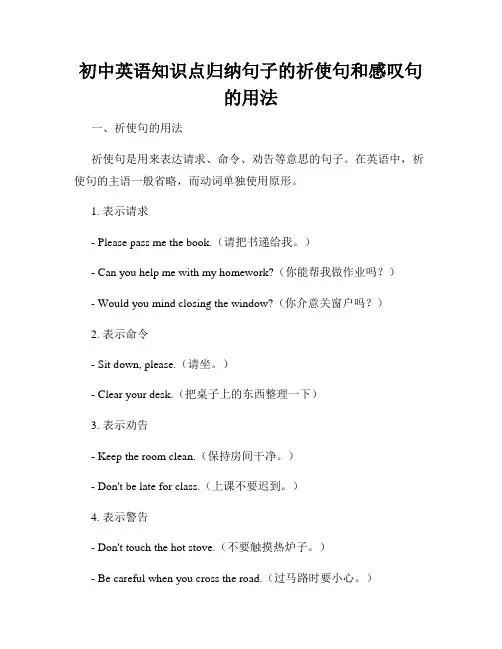
初中英语知识点归纳句子的祈使句和感叹句的用法一、祈使句的用法祈使句是用来表达请求、命令、劝告等意思的句子。
在英语中,祈使句的主语一般省略,而动词单独使用原形。
1. 表示请求- Please pass me the book.(请把书递给我。
)- Can you help me with my homework?(你能帮我做作业吗?)- Would you mind closing the window?(你介意关窗户吗?)2. 表示命令- Sit down, please.(请坐。
)- Clear your desk.(把桌子上的东西整理一下)3. 表示劝告- Keep the room clean.(保持房间干净。
)- Don't be late for class.(上课不要迟到。
)4. 表示警告- Don't touch the hot stove.(不要触摸热炉子。
)- Be careful when you cross the road.(过马路时要小心。
)二、感叹句的用法感叹句是用来表达惊喜、兴奋、疑问等强烈感情的句子。
在英语中,感叹句通常以"What"或"How"引导。
1. 表示惊奇或兴奋- What a beautiful flower!(多美的花啊!)- How amazing the fireworks are!(多么壮观的烟花啊!)2. 表示疑问- What time is it now?(现在几点了?)- How did you solve the math problem?(你是怎么解决这个数学题的?)3. 表示赞美- What a talented singer she is!(她真是个有才华的歌手!)- How wonderful the performance was!(演出太棒了!)4. 表示遗憾或抱怨- What a shame! I forgot to bring my wallet.(真糟糕!我忘记带钱包了。



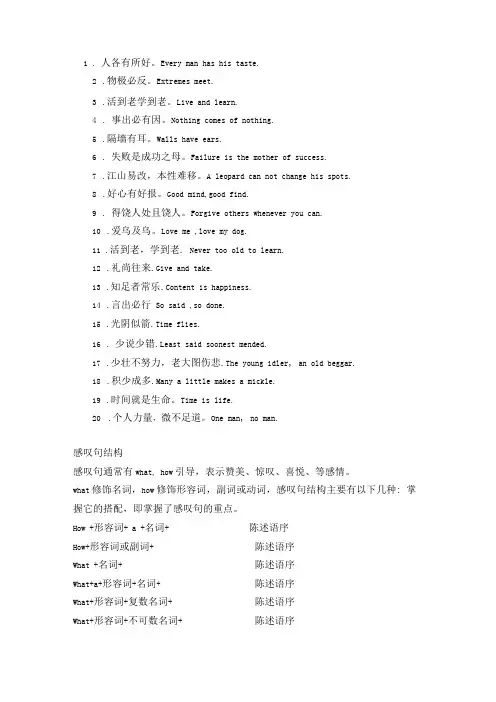
1. 人各有所好。
Every man has his taste.2.物极必反。
Extremes meet.3.活到老学到老。
Live and learn.4. 事出必有因。
Nothing comes of nothing.5.隔墙有耳。
Walls have ears.6. 失败是成功之母。
Failure is the mother of success.7.江山易改,本性难移。
A leopard can not change his spots.8.好心有好报。
Good mind,good find.9. 得饶人处且饶人。
Forgive others whenever you can.10.爱乌及乌。
Love me ,love my dog.11.活到老,学到老. Never too old to learn.12.礼尚往来.Give and take.13.知足者常乐.Content is happiness.14.言出必行So said ,so done.15.光阴似箭.Time flies.16. 少说少错.Least said soonest mended.17.少壮不努力,老大图伤悲.The young idler, an old beggar.18.积少成多.Many a little makes a mickle.19.时间就是生命。
Time is life.20.个人力量,微不足道。
One man, no man.感叹句结构感叹句通常有what, how引导,表示赞美、惊叹、喜悦、等感情。
what修饰名词,how修饰形容词,副词或动词,感叹句结构主要有以下几种: 掌握它的搭配,即掌握了感叹句的重点。
How +形容词+ a +名词+ 陈述语序How+形容词或副词+ 陈述语序What +名词+ 陈述语序What+a+形容词+名词+ 陈述语序What+形容词+复数名词+ 陈述语序What+形容词+不可数名词+ 陈述语序How clever a boy he is!How lovely the baby is!What noise they are making!What a clever boy he is!What wonderful ideas (we have)!What cold weather it is!感叹句的省略形式为:What a clever boy (he is)!典型例题1)food you've cooked!A. How a niceB. What a niceC. How niceD. What nice答案D.由于How修饰形容词,副词;what修饰名词。

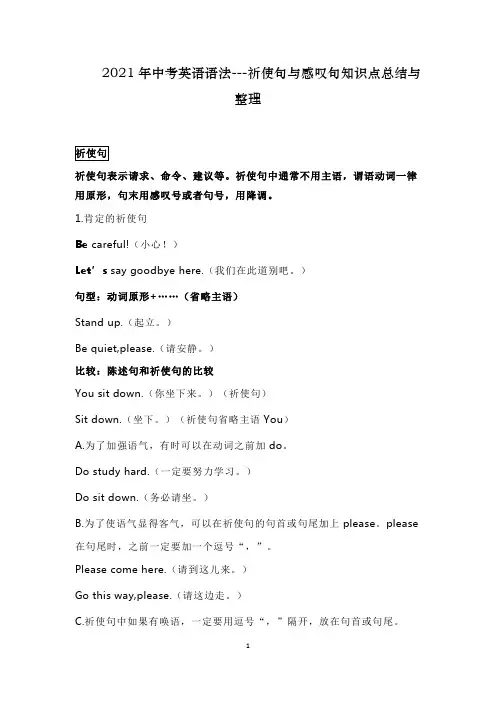
2021年中考英语语法---祈使句与感叹句知识点总结与整理祈使句祈使句表示请求、命令、建议等。
祈使句中通常不用主语,谓语动词一律用原形,句末用感叹号或者句号,用降调。
1.肯定的祈使句Be careful!(小心!)Let’s say goodbye here.(我们在此道别吧。
)句型:动词原形+……(省略主语)Stand up.(起立。
)Be quiet,please.(请安静。
)比较:陈述句和祈使句的比较You sit down.(你坐下来。
)(祈使句)Sit down.(坐下。
)(祈使句省略主语You)A.为了加强语气,有时可以在动词之前加do。
Do study hard.(一定要努力学习。
)Do sit down.(务必请坐。
)B.为了使语气显得客气,可以在祈使句的句首或句尾加上please。
please 在句尾时,之前一定要加一个逗号“,”。
Please come here.(请到这儿来。
)Go this way,please.(请这边走。
)C.祈使句中如果有唤语,一定要用逗号“,”隔开,放在句首或句尾。
Justin,come here.(贾斯廷,过来。
)Here you are,Robert.(给你,罗伯特。
)句型:Let+第一人称代词(me/us)+动词原形+……Let+第三人称代词(him/her/it/them)或名词+动词原形+……Let’s go to Maldives at once.(咱们马上动身去马尔代夫吧。
)Let me try again.(让我再试试。
)Let her tell everyone.(让她去告诉大家。
)Let Tom go there himself.(让汤姆自己去那儿。
)2.否定的祈使句Don’t make such a noise.(不要这么吵。
)Don’t let him do that again.(别让他再那么做了。
)句型:Don’t+动词原形+……Don’t swim in the river.(别在河里游泳。

初中英语知识点:感叹句和祈使句知识点总结一、感叹句感叹句是用来表达喜、怒、哀、乐等强烈感情的一种句式。
尽管感叹句的表现形式多种多样,但主要的表现形式只有两种,即what和how引导的感叹句。
what修饰名词,how修饰形容词、副词或动词。
1、由感叹词what引导的感叹句。
what修饰名词或名词短语,有以下两种形式:1)What+a(an)+(形容词)+单数可数名词+主语+谓语!或是:What+名词词组+主语+谓语! 如:What a fine day it is!2) What+(形容词)+可数名词复数或不可数名词+主语+谓语! 如:What kind women they are! What nice music it is!2、由How引导的感叹句。
how用来修饰形容词、副词或动词。
其结构是:How+形容词(副词)+主语+谓语! 例如:How hard the workers are working!How clever the girl is!注意:当how修饰动词时,动词不跟着感叹词提到主语之前。
How fast the runner runs!3、what与how引导的感叹句,一般情况下可以相互转换,转换后意义不变。
(具体见下)如:What an interesting story it is!==How interesting the story is!what a beautiful building it is!==How beautiful the building is!在口语中,感叹句的主语和谓语常常省略。
如:What a nice present!(省略it is) How disappointed!(省略she is或其它可作本句主、谓的词语)二、祈使句用于表达命令、请求、劝告、警告、禁止等的句子叫做祈使句,祈使句通常省略主语,谓语动词用原形,句尾用感叹号或句号。
1、肯定结构:1)动词原形(+宾语)+其它成分。
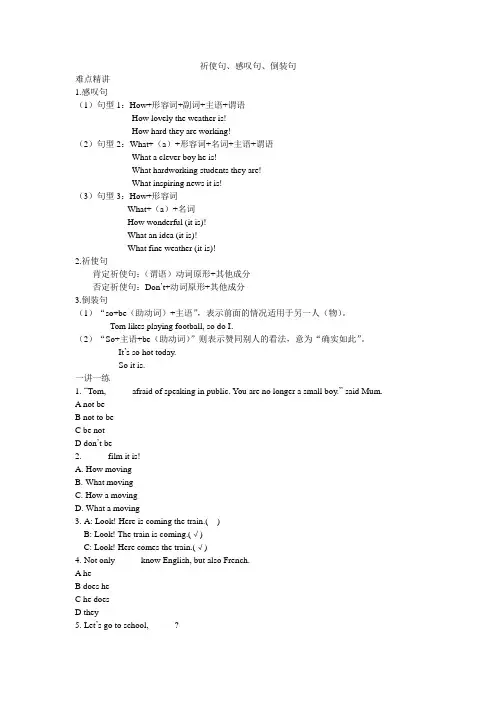
祈使句、感叹句、倒装句难点精讲1.感叹句(1)句型1:How+形容词+副词+主语+谓语How lovely the weather is!How hard they are working!(2)句型2:What+(a)+形容词+名词+主语+谓语What a clever boy he is!What hardworking students they are!What inspiring news it is!(3)句型3:How+形容词What+(a)+名词How wonderful (it is)!What an idea (it is)!What fine weather (it is)!2.祈使句肯定祈使句:(谓语)动词原形+其他成分否定祈使句:Don’t+动词原形+其他成分3.倒装句(1)“so+be(助动词)+主语”,表示前面的情况适用于另一人(物)。
Tom likes playing football, so do I.(2)“So+主语+be(助动词)”则表示赞同别人的看法,意为“确实如此”。
---It’s so hot today.---So it is.一讲一练1.“Tom, _____ afraid of speaking in public. You are no longer a small boy.” said Mum.A not beB not to beC be notD don’t be2._____ film it is!A.How movingB.What movingC.How a movingD.What a moving3.A: Look! Here is coming the train.( )B: Look! The train is coming.(√)C: Look! Here comes the train.(√)4.Not only _____ know English, but also French.A heB does heC he doesD they5.Let’s go to school, _____ ?B will youC won’t youD do youA组:选择1.“ _____ fine weather!” she said.A.HowB.How aC.WhatD.What a2.Go and _____ the TV quickly. The volleyball match will begin right away.A turn offB turn downC turn upD turn on3.Mother said to him, “Don’t _____ on football.”A spend too much timeB to spend too much timeC spend too many timeD to spend too many time4.My sister doesn’t like skating, _____ .A so do IB so I don’tC neither I don’tD neither do I5.A: I want to do some shopping this afternoon.B: _____ .A.So I doB.I do soC.I don’t soD.So do I6._____ to meet me at the station. I’ll be waiting there.A.Not to forgetB.Not forgetC.Forget notD.Don’t forget7._____ a lovely day!A.WhatB.HowC.WhichD.When8._____ interesting!A.WhatB.HowD.When9.“ _____ late for class again,” said the teacher.A.Not to beB.Not beC.Don’t beD.Won’t be10._____ sunny day! Let’s go out for a walk.A.How aB.HowC.What aD.What。
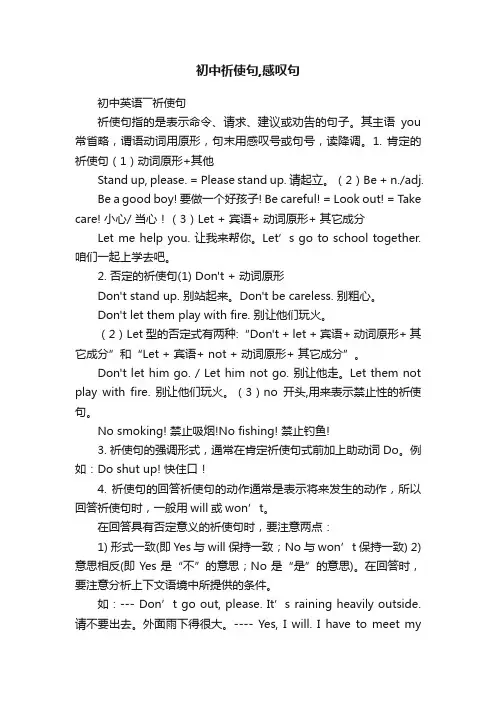
初中祈使句,感叹句初中英语――祈使句祈使句指的是表示命令、请求、建议或劝告的句子。
其主语you 常省略,谓语动词用原形,句末用感叹号或句号,读降调。
1. 肯定的祈使句(1)动词原形+其他Stand up, please. = Please stand up. 请起立。
(2)Be + n./adj.Be a good boy! 要做一个好孩子! Be careful! = Look out! = Take care! 小心/ 当心!(3)Let + 宾语+ 动词原形+ 其它成分Let me help you. 让我来帮你。
Let’s go to school together. 咱们一起上学去吧。
2. 否定的祈使句(1) Don't + 动词原形Don't stand up. 别站起来。
Don't be careless. 别粗心。
Don't let them play with fire. 别让他们玩火。
(2)Let型的否定式有两种:“Don't + let + 宾语+ 动词原形+ 其它成分”和“Let + 宾语+ not + 动词原形+ 其它成分”。
Don't let him go. / Let him not go. 别让他走。
Let them not play with fire. 别让他们玩火。
(3)no开头,用来表示禁止性的祈使句。
No smoking! 禁止吸烟!No fishing! 禁止钓鱼!3. 祈使句的强调形式,通常在肯定祈使句式前加上助动词Do。
例如:Do shut up! 快住口!4. 祈使句的回答祈使句的动作通常是表示将来发生的动作,所以回答祈使句时,一般用will或won’t。
在回答具有否定意义的祈使句时,要注意两点:1) 形式一致(即Yes与will保持一致;No与won’t保持一致) 2) 意思相反(即Yes是“不”的意思;No是“是”的意思)。
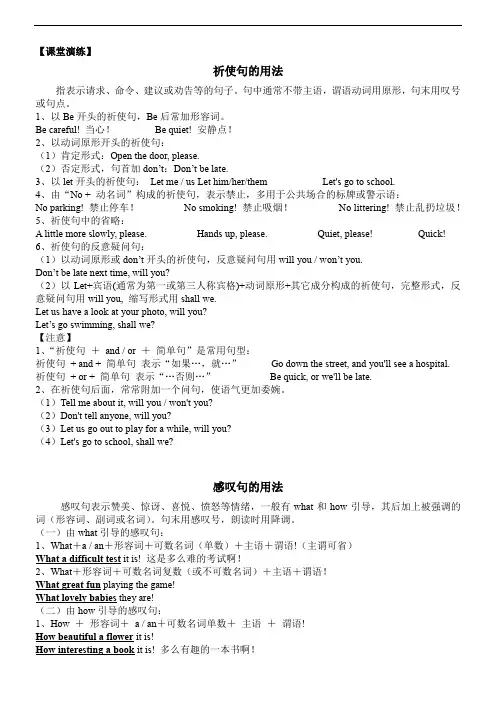
【课堂演练】祈使句的用法指表示请求、命令、建议或劝告等的句子。
句中通常不带主语,谓语动词用原形,句末用叹号或句点。
1、以Be开头的祈使句,Be后常加形容词。
Be careful! 当心!Be quiet! 安静点!2、以动词原形开头的祈使句:(1)肯定形式:Open the door, please.(2)否定形式,句首加don’t:Don’t be late.3、以let开头的祈使句:Let me/us Let him/her/them Let's go to school.4、由“No + 动名词”构成的祈使句,表示禁止,多用于公共场合的标牌或警示语:No parking! 禁止停车!No smoking! 禁止吸烟!No littering! 禁止乱扔垃圾!5、祈使句中的省略:A little more slowly, please. Hands up, please.Quiet, please! Quick!6、祈使句的反意疑问句:(1)以动词原形或don’t开头的祈使句,反意疑问句用will you / won’t you.Don’t be late next time, will you?(2)以Let+宾语(通常为第一或第三人称宾格)+动词原形+其它成分构成的祈使句,完整形式,反意疑问句用will you, 缩写形式用shall we.Let us have a look at your photo, will you?Let’s go swimming, shall we?【注意】1、“祈使句+and/or +简单句”是常用句型:祈使句+ and + 简单句表示“如果…,就…”Go down the street,and you'll see a hospital.祈使句+ or + 简单句表示“…否则…”Be quick,or we'll be late.2、在祈使句后面,常常附加一个问句,使语气更加委婉。
句型(一)祈使句祈使句表示命令、请求、建议或劝告等。
主语通常被省略,谓语动词用原形,句末用感叹号或句号,读降调。
1.肯定的祈使句(1)句型:以动词原形开头+其他成分。
如:Come in!进来!(2)有时为了加强语气,可以在动词之前加上do表示“务必,一定”。
如:Do come on time!一定要准时来!Do look out!一定要小心!2.否定的祈使句句型:(1)Don't+动词原形+其他成分。
如:Don't be late.不要迟到。
(2)Let's+not+动词原形+其他成分。
如:Let's not speak loudly.我们不要大声说话。
二、感叹句1.What引导的感叹句1)What+a/an +形容词+可数名词的单数形式+主语+谓语!What a beautiful girl she is!她是一个多么漂亮的女孩儿啊!2)What+形容词+可数名词的复数形式+主语+谓语!What important jobs they have done!他们做了多么重要的工作呀!3)What+形容词+不可数名词+主语+谓语!What sweet water it is!多甜的水呀!2.How引导的感叹句1)How+形容词或副词+主语+谓语!How interesting the dog is!多么有趣的狗呀!2)How+形容词+a/an+可数名词的单数形式+主语+谓语!How useful a subject it is!多么有用的一门科目呀!3)How+主语+谓语!How time flies! 时间过得真快呀!1.(2019青岛,7)____ special classes we had! We have learned a lot about paper cutting.A.WhatB.What aC.How aD.How2.(2018临沂,29)____popular festival Halloween is in North America!A.WhatB.What aC.HowD.How a3.(2018 滨州,26)—____ convenient it is to live in China!—Yes,we've got WeChat, shared bikes, Alipay, etc.A.What aB.WhatC.How aD.How4.(2017临沂,27)___ amazing concert Li Yundi gave in Linyi!A.How anB.HowC.What anD.What5.(2017 东营,34)___exciting it is! Our country put her first homemade aircraft carrier(国产航空母舰)in the water on April 26 in Dalian.A.HowB.WhatC.How anD.What an6.(2016泰安,33)As we all know ,life is short and amazing. ____it!A.EnjoyB.To enjoyC.EnjoyingD.Enjoyed7.(2016烟台,25____ weather it is! Shall we go for a picnic?—I can't agree more.A.What a goodB.What goodC.How good theD.How good8.(2015济宁,21)—Wow! _____beautiful the music is!—Yes.That's my favorite.A.WhatB.What aC.What anD.How9.(2015威海,37)—Wow! I've got an A in my math test. ______wonderful news it is!A.WhatB.HowC.What aD.How a10.(2019威海,43)看,她买了条多么漂亮的裙子呀!。
一、感叹句感叹句是表示喜怒哀乐等强烈感情的句子。
感叹句句末通常用感叹号,读时一般用降调。
1) What +a/an+形容词+名词+其他成分!例:→What an interesting film it is! 这是一部多有趣的电影啊!2) What + 形容词+复数名词+其他成分!例: What beautiful flowers they are! (它们是)多么漂亮的花啊!3) What + 形容词+不可数名词+其他成分!例:→What wonderful weather! 天气真好!【说明】在感叹句中,What a / an 常用来修饰单数可数名词,若其前面的形容词为元音开头,则用 an。
what 是用来修饰复数可数名词和不可数名词。
但有些不可数名词,如 rain, surprise, breakfast, lunch 等,当前面有形容词修饰,使抽象名词具体化时,则要用 what a / an,如:What a heavy rain it is! 多大的一场雨啊!What a great surprise it is! 这多么令人惊奇啊!What a rich breakfast it is! 多么丰盛的一顿早餐啊!1) How +形容词+ a/an +名词+其他成分!(how引导感叹句,名词放在形容词后)How careful a boy he is! 他是多么细心的一个男孩啊!对比: What a carful boy he is!2) How+形容词或副词+其他成分!例: How carefully he did the work! 他做这工作多仔细啊!三(1)一找·二断·三辨·四确定:构成感叹句的感叹词有两个:what和how,其基本结构是:1)What+名词+陈述肯定式:2)How+形容词(或副词)+陈述肯定式很多同学常常对该用what还是该用how弄不清楚。
11.Will you please close the door? 12. Will you please not smoke here?祈使句和叹息句祈使句:一、祈使句的观点:1.祈使句表示命令、恳求,建议或劝说等等。
主语往常省略,谓语动词用原形,句末用惊讶号或句号,用降调.注意:有时为了增强语气或明确指出说话对象,主语you 不省略,否认祈使句的主语 you 放在 don’t 以后。
例:1.You two read the text,please . 请你们两个人读课文。
2.Don't you be late again.你可别再迟到了。
二、祈使句的构造和用法:(一)、必定的析使句。
1.句型:动词原形 (省略主语 )。
比如: Stand up,please或P1ease, stand up.请起立!Be quiet!寂静!2.有时为了增强语气,能够在动词以前加do。
比如:Do study hard.必定要努力学习。
(二)、否认的祈使句。
句型:① Don't+动词原形。
比如:Don't be late.别迟到。
比如: Please don`t be careless !请不要马虎. (please一般放在 don't 前)②Let`s + not + 动词原形。
Let's not say anything about it . 关于这件事,我们什么也不要说。
③D on't let +第三人称 (宾格 )+动词原形或 1et + 第三人称 + not + v(原)Don't 1et them play with fire .别让他们玩火。
Let them not play withfire!让他们别玩火,三、祈使句的几个常有构造:1.必定的祈使句的反意疑问句反问部分可用will you/won ’tyou.eg:Come over to my home for supper with me,Will you?到我家来与我一同吃晚餐,好吗?2.否认的祈使句的反意疑问句反问部分只用will you .eg: Don't be late f or scboo1,will you?不要迟到,好吗?3. 以 Let's 开头的祈使句的反意疑问句反问都分用,shall we .Let`s ,splay games,shall we?我们一同玩游戏,好吗?4.析使句 +and/or+ 简单句,相当于一个以if 指引的条件状语从句. eg:Hurry up,Or we'11 be 1ate for school.= if we don't hurry up,we'11 be late forschoo1.有关练习:一、用所给词的适合形式填空1. Please______ (open) the door.2. _____ (100k) at the picture, please .3. ______ (not be) careless. 4. ______ (be)quiet,please.5. Please_____ (not watch)TV so much, Jim !6 (1et) ___ me ___(have)a look at the photo.7. 1et the boy _____(go) out at night.8. Let the boy_____ _________(not go)out at night.二、句型变换 A .将以下句子改为祈使句。
中考英语感叹句与祈使句专讲(知识梳理练习)中考英语感叹句与祈使句专讲(知识梳理+练习)感叹句和祈使句都是中考考察的重点,在选择题、句型转换、填空和改错等题型中都会出现。
这属于语法的基础部分,也是重点部分。
需要完全搞懂,驾轻就熟。
一、感叹句感叹句的概念:感叹句表示快乐、惊讶、悲哀、厌恶、恐惧等浓厚和强烈的感情。
感叹句一般用降调,句末都用叹号。
感叹句构成;How或what(a、an)+感叹部分+陈述句(主谓)感叹句一般用感叹词How或What引导。
How作状语,修饰形容词、副词或动词,What作定语,修饰名词。
(一)由感叹词what引导的感叹句。
注意,What引导的感叹句感叹部分主体是名词。
1、 What+a/an+(形容词)+单数可数名词+主谓+!例句:What a fine day it is!2、What+(形容词)+可数名词复数或不可数名词+主谓+!例句:What kind women they are!3、What+形容词+不可数名词+主谓!例句:What nice music it is!(二)由How引导的感叹句。
注意,how引导的感叹句,主体部分是形容词、副词或动词。
1、How+形容词(副词)+主谓+!例句:How hard the workers are working! 工人工作是多么努力啊!How clever the girl is! 那女孩是多么聪明啊!How quickly the boy is writing! 那男孩写得多快啊!How fast he runs! 他跑得多么快啊!2、How+主谓+!例句:How time flies! 时光飞逝!(三)注意:1、当how修饰副词时,动词不跟着感叹词提到主语之前,保持感叹词+感叹部分+主谓这个结构。
如: How fast the runner runs!2、what引导的感叹句与how引导的感叹句可以相互转换,转换后意义不变。
初中英语――祈使句祈使句指的是表示命令、请求、建议或劝告的句子。
其主语you常省略,谓语动词用原形,句末用感叹号或句号,读降调。
1. 肯定的祈使句(1)动词原形+其他Stand up, please. = Please stand up. 请起立。
(2)Be + n./adj.Be a good boy! 要做一个好孩子! Be careful! = Look out! = Take care! 小心/ 当心!(3)Let + 宾语+ 动词原形+ 其它成分Let me help you. 让我来帮你。
Let’s go to school together. 咱们一起上学去吧。
2. 否定的祈使句(1) Don't + 动词原形Don't stand up. 别站起来。
Don't be careless. 别粗心。
Don't let them play with fire. 别让他们玩火。
(2)Let型的否定式有两种:“Don't + let + 宾语+ 动词原形+ 其它成分”和“Let + 宾语+ not + 动词原形+ 其它成分”。
Don't let him go. / Let him not go. 别让他走。
Let them not play with fire. 别让他们玩火。
(3)no开头,用来表示禁止性的祈使句。
No smoking! 禁止吸烟!No fishing! 禁止钓鱼!3. 祈使句的强调形式,通常在肯定祈使句式前加上助动词Do。
例如:Do shut up! 快住口!4. 祈使句的回答祈使句的动作通常是表示将来发生的动作,所以回答祈使句时,一般用will或won’t。
在回答具有否定意义的祈使句时,要注意两点:1) 形式一致(即Yes与will保持一致;No与won’t保持一致) 2) 意思相反(即Yes是“不”的意思;No是“是”的意思)。
在回答时,要注意分析上下文语境中所提供的条件。
如:--- Don’t go out, please. It’s raining heavily outside. 请不要出去。
外面雨下得很大。
---- Yes, I will. I have to meet my brother at the airport. 不行,我得去机场接我弟弟。
5. 祈使句的反意疑问句(1) 肯定祈使句的反意疑问句反问部分用will you 或won't you。
Please open the door, will/ won’t you? 请把门打开,好吗?(2) 否定祈使句的反意疑问句反问部分只用will you。
Don't be late again, will you? 别再迟到了,行不行?(3) 以let's开头的祈使句反意疑问句反问部分用shall we。
Let's turn on the TV, shall we? 我们把电视打开,好吗?<特别注意> 只有以let's开头的祈使句的反意疑问句的反问部分才用shall we,而let us 开头的祈使句的反意疑问句的反问部分应为will you或won't you.如:Let us stay here, will/ won't you? 请(你)让我们留在这好吗?一. 用括号内所给动词的适当形式填空。
1. It’s an important meeting. _________________ (not, be )late.2. ________________ (not,make) any nise! Your mother is sleeping.3. ________________ (not, speak) with your mouth full of food and _________ (be) polite.4. ________________ ( not, talk) and ____________ (read) aloud.5. _______________ (not,leave) your homework for tomorrow, Larry.6. ________________ (look) out! A car is coming.7. _______________ (give) us ten years and just see what our country will be like.8. ________________ (not, let) the baby cry.9. Wear more clothes or you ____________ (catch) a cold.10. Let’s _______________ (not, say) anything about it.二、单项选择1. The TV is too loud. Please________.A. turn it downB. to turn it downC. turn down itD. to turn down it2. _______ late again, Bill!A. Don't to beB. Don't beC. Not beD. Be not3. _______ cross the road until the traffic lights turn green.A. NotB. Won'tC. Doesn'tD. Don't4. Please help me carry it, ______?A. will IB. will youC. shall ID. shall we5. Don't make so much noise, ______?A. will youB. won't youC. shall weD. do you6. Do you know the girl ______under the tree?A. standB. to standC. standingD. stood7. Kate, _______ your homework here tomorrow.A. bringB. bringsC. to bringD. bringing8. ________ me the truth, or I'll be angry.A. TellingB. To tellC. ToldD. Tell10. Don't you know that _______ is good for our health?A. swimB. swimmingC. swamD. swims11 .Her doctor said: “________ work so hard”A StopB Don’tC Can’tD No12. Sindy, ________ to be here at 8 o’clockA is sureB is sure thatC will be sureD be sure13.________ when you cross the road.A Do careB CareC Do be carefulD To be careful14. ________him the secret, will you?A Don’t tellB Not to tellC Not tellingD No telling15. ________ in bed. It’s bad for your eyes.A Not to readB Don’t readC Don’t to readD Not read16. ________ Your child. We’ll look after him.A Not to worry aboutB Don’t worry aboutC Not worry forD Don’t worry with17.They are very tired. Why ________ have a rest?A not theyB do not theyC don’t theyD not to18 --You look rather tired. ________ stopping to have a rest? -- All right.A Why notB How aboutC Why not toD why don’t19 ______ tell a lie.A HardlyB NotC NoD Never20.Please ________ look outside. Look at the blackboard.A notB don’tC aren’tD can’t三、句型转换1. Will you please read it again more slowly? (改为祈使句)_______ ________ again more slowly, please.2. If you don't listen to me, I'll go. (改为同义句)________ ________me, or I’ll go.3. Let's watch the sports games. (改为反意疑问句)Let's watch the sports games, _______ _____?4. The teachers often tell the students not to be careless. (改为祈使句)_______ _______careless, please.5. Please sit next to Nancy. (改为否定句)_______ _______ next to Nancy.6. Don't forget to turn off the lights, please. (改为反意疑问句)Don't forget to turn off the lights, _______ _______?7. If you move, you'll die. (改为同义句)_______ ______, or you'll die.8. Come to my house tomorrow. (改为反意疑问句)Come to my house tomorrow, _______ _______?四、将下列汉语翻译成英语。